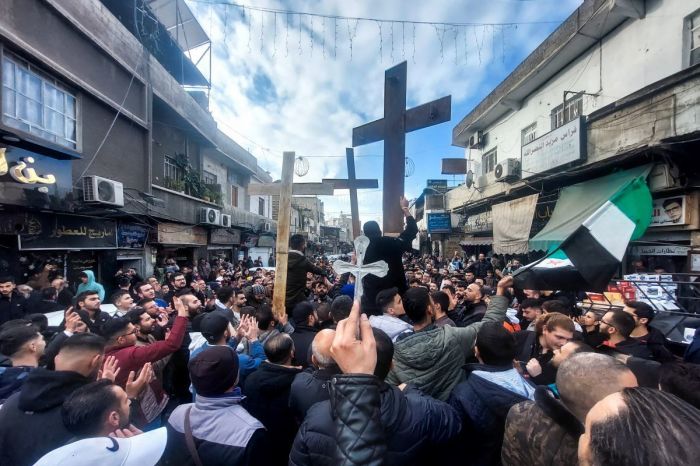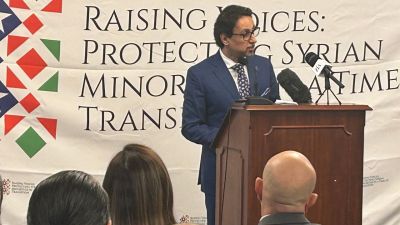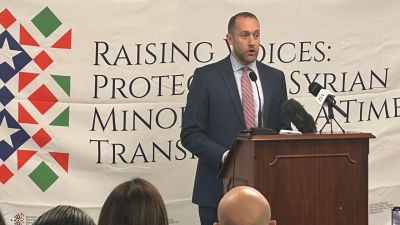
WASHINGTON — Radical jihadis and other extremist groups have carried out brutal mass killings and other human rights violations against Syria’s religious minorities, prompting calls from religious freedom advocates for the United States to take action.
Dr. Morhaf Ibrahim, president of the Alawites Association of the United States, says the attacks against Syria’s Christian, Alawite and Druze communities are not just random acts of violence.
“It’s a deliberate campaign of terror,” Ibrahim declared during a Wednesday press conference AAUS hosted on Capitol Hill to discuss the atrocities committed against Syrian ethno-religious minorities.
Since the fall of the Assad regime in December 2024, Syria’s religious minorities are facing a rapid increase in violence from foreign jihadis, Assad loyalists and militias unleashed by Syrian leader Ahmed al-Sharaa, Ibrahim said.
After the Islamic alliance Hayat Tahrir al-Sham, which is made up of former Islamic State and Al Qaeda fighters, ousted President Bashar al-Assad, religious freedom advocates have feared for the safety of Christians and other minority groups.

Following an Assad loyalist insurgency, Sunni fighters slaughtered almost 1,500 Alawite community members along Syria’s Mediterranean coast in early March, according to Reuters. The report highlighted the sheer brutality with which the perpetrators treated the victims, including one man whose heart was ripped out of his chest and placed on his body for his father to find.
Ibrahim condemned other brutalities committed against religious minorities, such as the abduction of women and girls who are then sold into sexual slavery or forced into marriages.
On June 22, a bombing at the Mar Elias Church in Damascus killed over two dozen people. The bomber wore an explosive vest as he entered the church during a Sunday morning prayer service, where he proceeded to open fire on congregants.
“Syrian Christians who have endured centuries of political repression and sectarian violence now face an existential crisis,” Richard Ghazal, the executive director of In Defense of Christians, which advocates for the protection of Christians in the Middle East, said.

He believes the attack illustrates a “sobering reality.”
“With every suicide bombing, every desecrated church, every community exodus, Syria edges closer to losing a 2,000-year-old spiritual and cultural pillar,” Ghazal said.
Before the start of the Syrian Civil War in 2011, Christians made up about 10% (2 million) of the Syrian population and co-existed with Muslim neighbors as the area is home to one of the world’s oldest Christian communities. Today, fewer than 300,000 Christians remain in Syria.
The ancient Syrian city of Antioch is where followers of Jesus were first called Christians, Ghazal noted, and the road to the capital of Damascus is where the Apostle Paul, formerly known as Saul, became blind after an encounter with Jesus. The experience marked Paul’s conversion from a persecutor of Christians to a devout follower of Christ.
The June attack on the church was not just another act of terror, but “a signal of the accelerated cultural and religious erasure,” Ghazal said.
Crediting Christians, Alawites and Druze communities with having served as a “moderating force” in Syria, modeling virtues such as compassion while providing an example of peaceful coexistence, Ghazal warned about the negative impact their elimination would cause.
“Their elimination would cause a narrowing of ideas, a narrowing of identities, and a narrowing of beliefs, which would enable radical ideologies to reach an otherwise moderate Muslim demographic,” the IDC executive director said.
Christianity’s extinction in Syria would also, as Ghazal described it, “mark the loss of a vital bridge between East and West.”
“Syriac Christianity has provided unique access into the mind, culture, and worldview native to Christ and the Apostles, and thus shaped the theology of the early Church and connected the Western tradition with its Semitic roots,” the advocate explained. “Its loss would sever a crucial link in this shared civilizational heritage.”
In response to increasing Sunni radicalism and violence from other groups, Ghazal urged the U.S. to press Syria’s interim government to seek accountability against the perpetrators of violent attacks against ethno-religious minorities.
As the advocate acknowledged, however, Syria’s interim government is a coalition of Islamic factions.
“Any diplomatic normalization must be strategically structured to establish guardrails for the transitional government’s behavior and mechanisms for accountability, providing a framework for leverage and influence,” Ghazal advised.
“The U. S. must condition any formal diplomatic normalization on the Syrian transitional governance, guaranteed to protect minority rights, religious freedom, and enshrine constitutional safeguards,” he added.
Ibrahim wants to see the U.S. Congress and the Trump administration “take immediate action that reflects America’s leadership in defending human rights and protecting minorities” by pressing the Syrian regime to halt its sectarian policies and support an inclusive government built on free and internationally monitored elections.
“Protecting Alawites, Christians, Druze, Kurds, and all minorities is not a moral imperative. It is the foundation of lasting peace in the Middle East,” Ibrahim said. “We believe that the best plan for a stable, prosperous Syria is by adopting decentralization.”
Decentralization, he said, would allow these minority communities to “freely govern themselves.”
Ghazal suggested several reforms, including constitutional protections for ethno-religious minorities, guaranteeing their right to worship and “participate freely in public life.” Ghazal also called for “the reform and professionalization” of Syrian security forces to replace “the patchwork militias and foreign jihadist fighters.”
“World leaders and policymakers must move beyond reactive condemnations and adopt proactive strategies to preserve what remains of Syria’s religiously diverse heritage, recognizing its enduring significance in global civilization,” Ghazal stated, warning that the consequences of indifference will not stop at Syria’s borders.
Samantha Kamman is a reporter for The Christian Post. She can be reached at: samantha.kamman@christianpost.com. Follow her on Twitter: @Samantha_Kamman

















